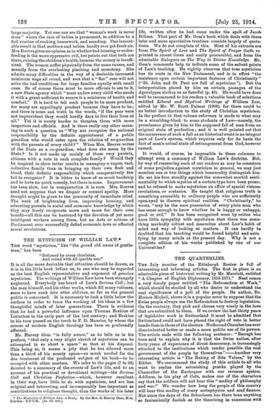THE MYSTICISM OF WILLIAM LAW" THE word "mysticism," like "the
grand old name of gentle- man," has been "Defamed by every charlatan, And soiled with all ignoble use."
It is all the more desirable that attention should be drawn, as it is in the little book before us, to one who may be regarded as the best English representative and exponent of genuiae mysticism. The writings of William Law have been strangely neglected. Everybody has beard of Law's Serious Call ; but the man himself, and his other works, which fill many volumes, seem to have sunk into utter oblivion, so far as the general public is concerned. It is necessary to look a little below the surface in order to trace the working of his ideas in a few thoughtful minds of later generations. There is evidence that he had a powerful influence upon Thomas Erskine of Linlat hen in the early part of the last century ; and Erskine in his turn passed on the torch to F. D. Maurice, by whom the course of modern English theology has been so profoundly affected.
Mr. Harvey Gem "is fully aware," as he tells us in his preface, "that only a very slight sketch of mysticism can be attempted in so short a space" as that at his disposal. This being so, it seems a pity that he has allowed more than a third of his scanty space—so much needed for the due treatment of the professed subject of his book—to be occupied with other matters. We refer to the pages (7 to 38) devoted to a summary of the events of Law's life, and to an account of his practical or devotional writings—the Serious Call and Christian Perfection—which, however excellent in their way, have little to do with mysticism, and are less original and interesting, and incomparably leas important as contributions to religious thought, than the works of his later
• The My:al:cum of William Law: a Study. By the Rev. S. Harvey Gem, M.A.
London: S.P.C.K. Cd. net.]
life, written after he had come under the spell of Jacob Bohme. That part of Mr. Gem's book which deals with these later and more speculative treatises consists largely of quota- tions. We do not complain of this. Most of his extracts are from The Spirit of Love and The Spirit of Prayer (both re printed in recent times and easily procurable), and from the admirable dialogues on The Way to Diuine Knowledge. Mr. Gem's comments help to indicate some of the salient points of Law's teaching. He rightly observes that true mysticism has its roots in the New Testament, and is in effect "the insistence upon certain important features of Christianity" (" St. John and St. Paul are full of mysticism "). But the interpretation placed by him on certain passages of the Apocalypse strikes us as fanciful (p. 48). He would have done well to recommend to his readers a valuable book of selections entitled Liberal and Mystical Writings of William Law, edited by Mr. W. Scott Palmer (1908), for there could be no better introduction to the study of Christian mysticism. In the preface to that volume reference is made to what may be a stumbling-block to some students of Law—namely, the prominence given by him to the supposed fall of man from an original state of perfection ; and it is well pointed out that the occurrence of such a fall as an historical event is no integral part of Law's system, which requires only for its basis the fact of man's actual state of estrangement from God, however caused.
It would, of course, be impossible in these columns to attempt even a summary of William Law's doctrine, But, by way of reassuring such of our readers as may be conscious of some prejudice against mysticism in general, we may just mention one or two things which honourably distinguish him. He set his face steadily against the somewhat morbid senti- mentality to which mystics of a certain type have been prone; and he refused to make mysticism an affair of special visions, revelations, or ecstasies. He taught that religions truth is something accessible to ordinary people who are sufficiently open-eyed to discern spiritual realities. "Christianity," he wrote, "may be the sure possession of every plain man who has sense enough to know whether be is happy or unhappy, good or evil" It has been recognized even by critics who have little sympathy with mysticism that there was some- thing markedly robust and masculine about Law's habit of mind and way of looking at matters. It can hardly be doubted that his teaching would be found helpful and satis fying by many minds at the present day. Why is not a complete edition of his works published by one of our Universities?






































 Previous page
Previous page